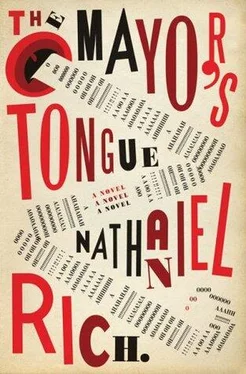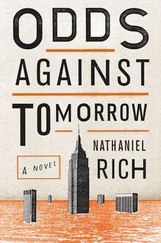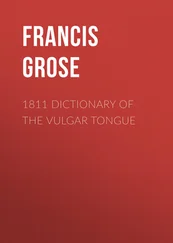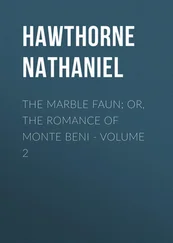Carlita smiled blankly. Perhaps it was a trick of the sun, but even in the flesh she seemed unreal; as she moved under the cherry tree, she flickered in the shifting light like a hologram.
"What'd you say?" said Mr. Schmitz.
"Ah, besides. You are in no state to go home."
"What do you mean by that?"
"You haven't fully recovered from her yet. She still has you wrapped around her little finger."
Mr. Schmitz thought of her little fingers, curled up into a fist.
"There may be some truth to that," he admitted, "but is that such a bad thing?"
"You haven't begun to enjoy your liberated life. Look what it might lead to," said Rutherford, and he shoved the uncomprehending Carlita at Mr. Schmitz." We'll find you one too. Better yet — many."
Carlita came closer, so close that Mr. Schmitz could feel her breath on his chin. Smiling, she embraced him, and then kissed him lightly on the lips. A foreign, flickering sensation rose in Mr. Schmitz's stomach and bubbled into his forehead. The odd smell of a new woman, the small brown mole at the corner of her mouth that he had never been near enough to observe, the whiteness of her scalp in the part of her hair. It was as if he had passed briefly into some other realm.
"I thank you," said Carlita. They were the first English words he had ever heard her pronounce. "I thank you, Signor Schmitz. For love."
Mr. Schmitz set furiously after his own chin. A dizzy mirage of romance and wanderlust passed over him, and he realized he could not go home, not yet. Carlita returned to Rutherford's side and he gave her behind a tender pat.
"You see, Signor Schmitz," he said, "there is more to be done before you go back to Agnes. A new world to be explored."
That night Rutherford called the priest in Avignon and booked two adjacent rooms in a honeymoon suite at a Paris hotel.
Now, at night, when Agnes twists in the grip of some indistinct nightmare, Mr. Schmitz looks longingly at her clenched fist. He encloses it in one of his oafish hands (Agnes always called them his mittens), and remembers her as a young woman — what it must have been like for her to wait out a war only to have Mr. Schmitz abandon her again. When he finally returned with Rutherford to the United States, after Carlita's fatal parturition, Mr. Schmitz was haunted and depressed, victimized by complex, kaleidoscopic nightmares. Agnes comforted him and he was made to swear oaths and flatter her, while showily castigating himself. Over time they gradually reconciled. But Agnes was never as trusting. Or as beautiful. Something in her face had soured and it never came back. So when he thinks now of her sadness he also remembers her beauty, changed by anger and disappointment, and wonders what might have been had he never left her that summer after the war. Sometimes at night — and this gives him great satisfaction — she sleepily moves her fist back and forth in his hand, as if, in her sleep, she is punching him.
It occurs to Mr. Schmitz that beauty, unlike love, doesn't fade. It becomes grotesque. Yellow hair turns to straw. Translucent, pale skin folds up and coarsens like canvas. Bones push out the skin like tent poles. Eyes pinken and distort. Love, on the other hand, enters a desert and dies of thirst. If only love became grotesque too, there would at least be some fascination in its decline. As Mr. Schmitz tries to figure out what it would mean for love to grow grotesque, he finds himself gazing into Agnes's nostrils; they crinkle and sniffle and finally bassoon sleep-mist over her mouth.
She comes to with a sudden sob. Mr. Schmitz takes her into his arms, cradling her against his chest — two bulks joining together under a mass of blanket. Agnes never explains what causes these crying jags, nor does Mr. Schmitz ask. To do so would be a breach of intimacy. He knows that if he inquired, Agnes would turn away; she might leave the room altogether and go write something down in the private journal that she hid from him. It's clear that she does not want to speak with him about her nighttime terrors. She allows him to witness her suffering, and to comfort her with his mittens, in exchange for his silence. And so, despite the absence of spoken communication, this is when he feels closest to her.
Several mornings later, in the blue hour that precedes dawn, Eugene left Abe's office after a long night of work. A fog had settled low over the street, which was empty, as empty as the street in Dolman Hardy . Birds made ugly twirping noises in Riverside Park. Eugene reached the corner at exactly the same time as Sonia, who was nearly knocked over by the collision.
"What are you doing here?"
They stared expectantly at each other — pale Sonia, her hair cinched with an elastic over her lightly freckled neck, and discombobulated Eugene, his sleepy eyes widening as his purple lips narrowed — and they smiled.
"I'm not leaving for a few more hours," said Sonia. "So I thought I should drop by to see my dad one last time, before I go away."
"He's quite asleep," said Eugene. "But I'll unlock the door for you if you like."
"Oh, I don't want to wake him. He'd be grumpy anyway." As soon as her laughter subsided, a melancholy look crept into her eyes.
"If you're not doing anything," she said, "maybe you'd like to take a walk around the block with me? I can let him sleep a little more."
"How about," suggested Eugene, "the park?"
She took his arm in hers. Her fingertips pressed into his bicep, which he instinctively flexed, and then immediately relaxed, embarrassed at the impulse. Something fragile shifted in his chest.
They crossed Riverside Drive and entered the park, the elm trees damp and the long walkway piebald with brown puddles. A stray cat ran in front of them and hid in an adjacent shrub, its tail languorously coiling around the leg of a white stone bench.
"Long night at the office?"
"When your father gets frustrated," said Eugene, "he throws pencils at me."
"He means well."
"It's true. He usually misses."
Eugene did not know what to do with the arm that Sonia was holding. He put his hand into his pocket, closing it around his keys, and made himself stand straight. Her small hands pressed lightly against his skin and he was suddenly aware of the slight variances in the pressure of each of her fingers as they strode from cement to macadam to grass to dirt to stone. A dull pain radiated from his elbow.
"Your father is going to miss you, I'm sure," he said. After which, he cursed himself silently for his mawkishness and resolved not to speak again.
"Dad misses Connie," said Sonia. "That's for sure."
They reached a long rectangular crabapple grove. The brown fruit hung on branches so tangled that it was impossible to tell whether they were many trees or a single one, and in several places the trunks had fused together. At one side of the grove a flock of pigeons surrounded a half-eaten cheeseburger, in its yellow wrapper. The pigeons took turns stepping up to the cheeseburger and pecking at the bun before scattering in retreat.
Sonia let go of Eugene's arm and strayed over to the crabapples. She plucked one from a nearby branch and tossed it to him underhand. He caught it and, in a mock heroic gesture, took a bite. The rancid fruit stung his tongue and he spat it out immediately. Several of the pigeons jumped over and approached the wet chunk of crabapple with great curiosity.
"I'd rather eat the cheeseburger," he said.
"So would they," she said, as the pigeons, after several trial pecks, flew back to the bun.
"Why are you working for my father anyway? If you don't mind my asking."
"I'm just trying to figure out what I want to do."
"You don't know yet?"
"Do you?"
"No," she said, and circled behind a trunk. "I don't. I'd like to keep my father happy before he dies."
Читать дальше












